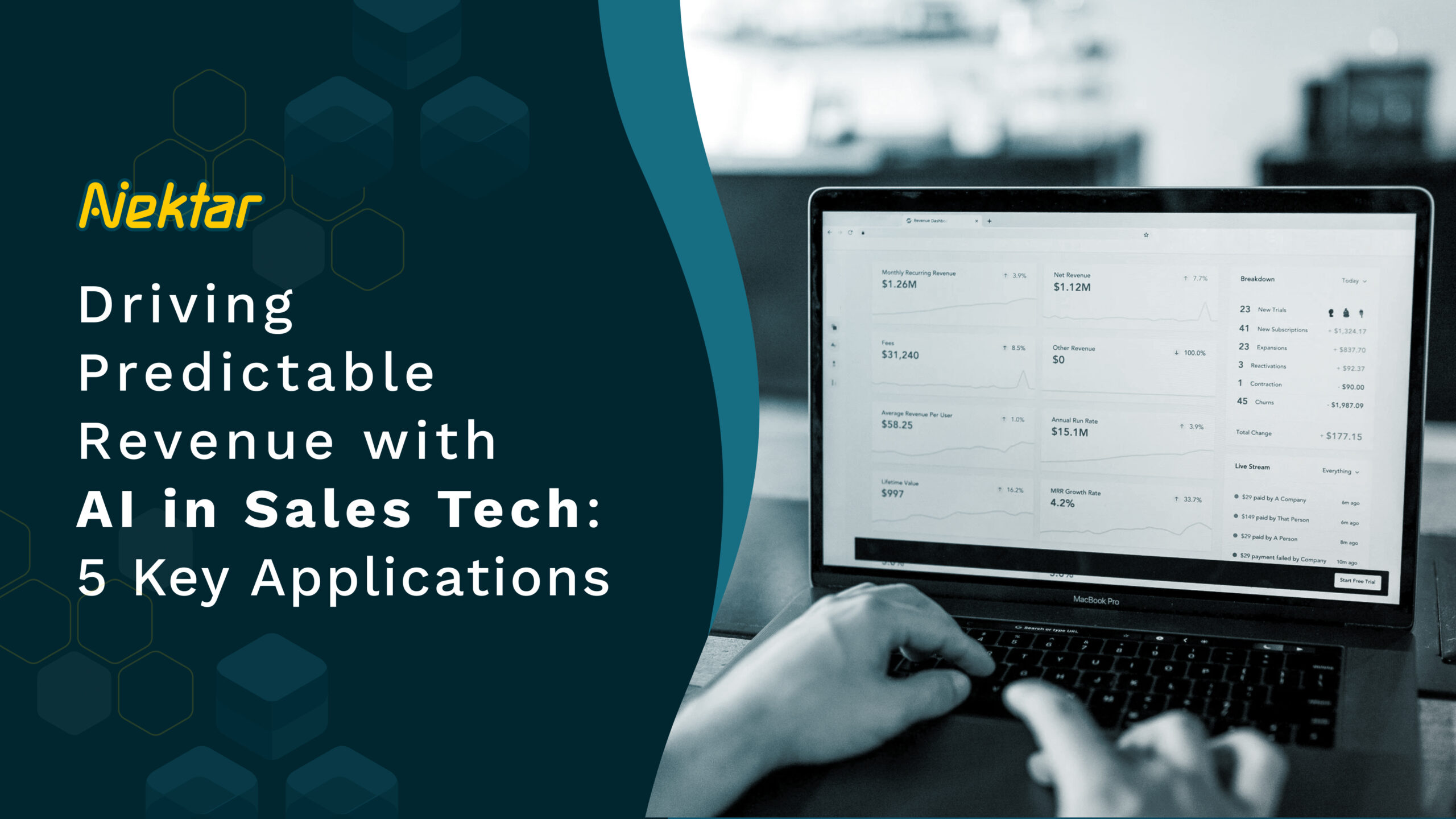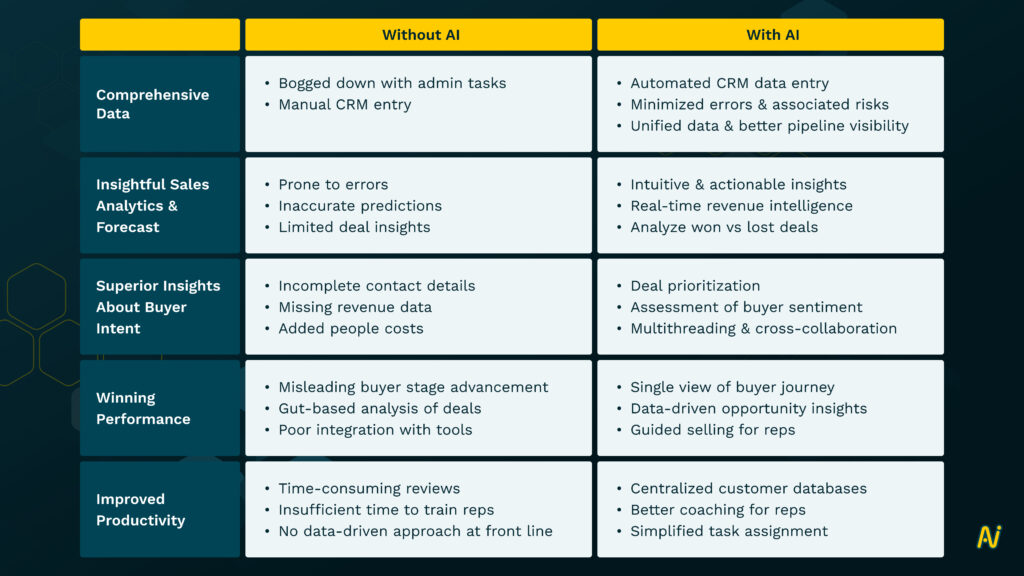
Driving Predictable Revenue with AI in Sales Tech: 5 Key Applications
Adoption of AI in sales is exploding! Find out 5 ways it’s helping drive predictable revenue for businesses.
Today, companies are no longer toying with the “what” and “why” of artificial intelligence or AI. Instead, they’re investing more time and resources into accelerating its adoption plans.
72% of business leaders feel optimistic about AI’s future role in business. And the AI market is projected to be $310 billion industry by 2026!
So, what does that mean for AI in sales?

Adoption of AI in Sales is Growing
“The only real management insights come from data analysis. Observations are nice, but they can deceive. Hunches are fun, but hard to defend. Data is the lifeblood of great sales management.”
Jason Jordan, Partner, Vantage Point Performance
Unlike traditional companies, organizations today make tactical and strategic decisions based on data rather than assumptions, hunches, guesswork, or anecdotal judgments. That’s where AI comes in.
AI in the sales market is expected to grow at an 11.4% CAGR and touch $92.8 billion in 2032. It’s also why AI has been the second most valuable tool for sales since 2019.
And that’s not it.
- Sales and marketing stand to gain the most revenue from adopting AI technologies to extract insights.
- 7 out of 10 top-performing salespeople expect improved intelligence forecasting.
- And 66% of them expect better opportunity insights and lead prioritizing.
AI technologies are helping boost sales productivity, forecast more accurately, deliver superior customer experiences, and boost overall sales performance.
5 Ways AI is Driving Predictable Revenue
AI in sales empowers teams to navigate the constantly evolving market conditions. Here are five ways it helps drive revenue for sales organizations.
1. Comprehensive Data
Without AI:
75% of sales reps say they have new responsibilities at work. Apart from selling, they are bogged down with data entry, quote generation, and other administrative tasks. Even in this digital age, salespeople frequently import data into spreadsheets and undertake additional research.
And there’s more!
Sales reps are usually swamped with back-to-back calls having little or no time to record important customer details. The result — inaccurate analysis and poor decision-making based on subjective opinions.
With AI:
Leveraging AI can help sales reps:
- Offload monotonous tasks that sales reps perform, such as data entry, leaving them free to focus on what matters the most: closing the deal.
- Minimize risks associated with manual errors. For instance, automated data entry provides clean and unified data and allows sales teams to gain deeper visibility into their pipeline.
- Enter data into the CRM. AI is perfect for this job as it improves the quality and relevance of information, capturing missing data points and using analytics to match contacts with the right opportunities.
- Get better visibility of their customer pipeline and adapt to their evolving needs. Additionally, it offers clear visibility between departments — marketing, RevOps, and customer support – ensuring a unified approach to closing deals.
To sum it up, AI drives revenue predictability by nudging sales leaders to win more deals and face fewer lost opportunities.
2. Insightful Sales Analytics & Forecast
Without AI:
The old sales forecasting methods follow manual data entry, prone to errors. Even as forecast accuracy is a top concern for sales leaders, inconsistent, manual methods of logging data lead to inaccurate predictions. And therefore, don’t highlight pipeline blindspots and process gaps.
Reps don’t get any information on which discussions advanced and why or how the deal size changes. They must dig deep into their pipeline to find clients with higher purchase intent. But these findings are based on the reps’ perception and not any logical sources..
With AI:
81% of the business buyers expect sellers to understand their needs. And in the current economic scenario, 88% of sellers are now coming to terms with this expectation. Customer experience has a significant impact on top-line revenue in all industries. And no one handles it better than AI.
AI in sales helps pull historical data while also using emotional recognition tools (NLP) to understand the context of a customer’s needs and expectations better. This allows intuitive and actionable sales insights based on all buyer contacts and previous sales outcomes. It also tracks and updates the CRM with changes in stakeholders over time.
What’s more? Accurate and real-time revenue intelligence offers transparency into pipeline health and frees up the reps’ time to engage in deeper conversations with the buyer!
When integrated with CRM systems, the platform’s AI can analyze won versus lost deals to detect trends and inform predictive lead scoring methods.
3. Superior Insights About Buyer Intent
Without AI:
Since sales teams have far more responsibilities on their plates, they tend to record primary details such as the first and last names of prospects. They may also miss out on critical revenue data owing to manual dependencies, hampering GTM execution.
But gathering complete information — email IDs, pain points, goals, concerns, and more — is essential. Manually entering data in the CRM is highly time-consuming, and your company may consider hiring more reps, adding to people costs.
Having quick access to accurate prospect data is crucial for reps. But according to research by Dun & Bradstreet, 91% of data in CRM systems is incomplete, 18% is duplicated, and 70% is rendered stale each year.
Incomplete sales activity data leads you to question — how engaged is your sales rep with the buying committee? Or are they engaged with multiple stakeholders at all?

With AI:
In a survey of over 2,900 sales professionals worldwide, 85% agree that sales ops are becoming more strategic. Fortunately, AI in sales offers a powerful antidote.
It can categorize enormous datasets and tell your sales reps which leads they should prioritize. It empowers salespeople to assess buyer sentiment and proactively redirect conversations. Agents can create custom sales pitches based on market conditions and determine how best to respond.
Best of all, AI can help in account mapping and understanding buyer personas, communicating analysis visually to support multithreading as well as cross-collaboration.
For example, you can use AI to generate actionable insights from sales activity data. It helps you run specific campaigns for targeted contacts, drilling down on purchase intent and identifying when a lead is close to buying or moving on.
Additionally, you get first-party data, making it easier to get rid of contacts and databases that are non-compliant or unengaged. The knock-on effect of this data hygiene activity can be very positive, helping reduce costs and increase predictable revenue.
4. Winning Performance
Without AI:
Stage advancement in a buyer journey based on manual tracking can be misleading as it doesn’t consider the purchase dynamics. And reps must go through vast amounts of data to optimize pricing or even figure out cross-selling and upselling opportunities.
Without AI and ML, existing platforms work independently without integration. This hinders visibility across teams (marketing, sales, and customer support) as they have to refer to multiple platforms while collecting information.
With AI:
On the other hand, when all your CRM data is enriched with the help of AI, the benefits are far-reaching. Businesses that implement AI see 59% better close rates for sales and 58% increased revenue.
AI in sales assists in automated management and scheduling of meetings. This bolsters reps’ performance by extracting deeper insights into buyer expectations. It also provides predictive analytics into cross-selling and upselling opportunities.
You can use Nektar’s AI technology to get predictive insights on higher-value deals and prioritize them, reducing the sales cycle time. Also, with reliable analytical insights, you can guide your sales reps with the following steps on all leads, opportunities, accounts, and tasks. It will work as a navigation system and help them close more deals.
5. Improved Productivity
Without AI:
Without tech support, sales reviews and analyzing failed deals can be time-consuming for managers. It becomes even more challenging when managing a large sales team, leaving little or no time to train new reps.
Furthermore, those that still operate in traditional ways find it challenging to keep up with digital clutter and are much less prepared for changes in the business environment. Sales reps are finding it difficult to adjust to this new reality, and the data-driven approach is yet to filter down to the front lines.
With AI:
Research by PwC finds that 54% of executives believe AI solutions have increased productivity.
AI boosts sales productivity and the ability to centralize disparate customer databases. And, in turn, captures the complete customer lifecycle — whether it has transpired via email, phone conversations, or other channels.
The changing sales ecosystem needs reps who are comfortable with technology and can keep up with new advancements. It’s time for managers to upskill themselves and coach their reps to drive better sales outcomes.
With accurate, relevant information produced via AI in sales, managers no longer have to follow up with reps for additional visibility on the pipeline. Instead, they can keep track of the buyer’s journey, rectify process gaps, and intervene at the right time to close the deal.
Or, if you’re using Nektar, you can collaborate with cross-functional teams and assign them tasks through a single, unified window of deal execution. This way, all parties – reps, managers, and leaders – have complete visibility of each contact in the buyer committee, even if one (or more) of them are not actively involved in the conversation.
Despite its effectiveness, certain skepticisms plague AI technologies, keeping businesses from implementing them for improved productivity.

Unfollow Myths Surrounding AI in Sales
To leverage AI successfully, it’s crucial to understand how it benefits sales reps in changing times and unfollow deep-rooted myths.
1. AI supports sales reps’ efforts through automation
AI replaces mundane tasks and enables sellers to make more accurate decisions via predictions, classifications, and clustering. While AI crunches data, identifies trends, and quickly collects information from multiple sources, there’s no way it can do that on its own.
It requires human intervention to put inputs and leverage outputs to the best use.
In other words — most AI sales tools are support wings that supercharge your reps’ efforts rather than automating them out of existence.
2. AI helps navigate uncertain and unpredictable times
Many assume AI goes out of the window during uncertain times because past data may not help. However, it continuously learns from this past data and predicts future trends.
The more data you feed into it, the more it learns, increasing its knowledge of associated risks and accuracy in deal predictions over time. Besides, it can identify patterns that even leaders may miss.
Thus, navigating uncertain times with AI allows sales teams to direct their efforts on devising better sales strategies.
3. AI is cognizant of privacy
To some of us, AI technologies seem to see and hear us at all times. However, AI in sales algorithms can only analyze the information they’re given. You can choose to restrict specific data and maintain the level of privacy required.
Additionally, if you’re using Nektar to enhance your revenue operations, the AWS cloud-only uploads agreed-upon data most relevant for optimizing your sales process.
Ultimately, it’s important to note that today’s business environment doesn’t pit AI against human resources but works with them to increase revenue.
Now that we have the myths out of the way, you can get started with AI in sales.
Getting Started With AI in Sales Tech
Deploying AI in your revenue intelligence tech stack is not a complicated process, but it needs focused implementation.
- Start by looking at your entire data ecosystem. Are all your data points synchronized or fragmented? The more unified the data, the easier it is to implement AI in sales.
- If your data is fragmented, you need to unify relevant data sources and organize them. “Relevant” means the information you are collecting should be instrumental in developing solutions.
- The next step is upskilling reps for a digital understanding of AI technologies in the sales process so that they can make the most of them.
- The last but most crucial step is partnering with an AI-powered revenue intelligence solution. The Unified Activity Capture Solution from Nektar captures data and automatically uploads it to your CRM. On top of that, AI adds a layer of intelligence to drive revenue.
It’s time you leverage AI to generate predictable revenue for your organization.
To streamline your workflows, Nektar’s unified data capture solution can extract information from multiple touch points such as calls, SMS, email, calendar, Slack, Zoom, and LinkedIn. The technology can gather, log, and process rich information including topics discussed, stakeholder details, buyer personas, and the next steps.
Nektar’s accuracy in contextual sorting of data is an industry-best at 90%. It gathers and analyzes millions of different historical plus real-time attributes (demographic, firmographic, geographic, activity data, and web behaviour) to determine customers’ buying readiness.
PUBLISHED BY









